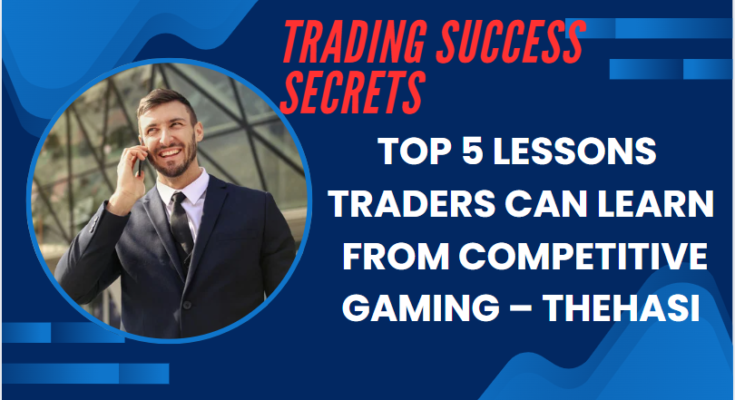The world of trading and competitive gaming may seem vastly different, yet they share fundamental principles that, when applied correctly, can lead to success. Competitive gaming demands strategic thinking, rapid decision-making, and emotional control, qualities that are just as essential in the world of trading. Both require the ability to stay calm under pressure, adjust to ever-changing environments, and make quick, calculated decisions.
In this article, we’ll explore five key lessons that traders can learn from competitive gaming, with practical takeaways to help you refine your approach to the markets and enhance your trading performance.
1. Adaptability: Stay Flexible, Be Prepared for Change
In competitive gaming, players must adapt to new game mechanics, updates, or the strategies of other players. Successful gamers recognize that each game is dynamic, and the ability to adjust quickly to new information or conditions is crucial. Similarly, the financial markets are ever-changing, with new trends, news, and economic conditions influencing prices.
Key Takeaways for Traders:
- Monitor Market Conditions: Just like gamers stay aware of in-game changes, traders must keep track of market developments. Whether it’s economic data releases, geopolitical events, or sudden price shifts, staying updated is essential to adapt your trading strategy accordingly.
- Be Ready to Pivot: In gaming, players quickly change their tactics when necessary. Traders should also be willing to pivot. If a particular strategy isn’t working, having the flexibility to adjust quickly can help mitigate losses and identify new opportunities.
- Embrace New Tools: Just as gamers rely on new technologies, traders can benefit from adopting modern tools like trading bots, automated systems, and data analysis platforms to stay competitive.
Example: A forex trader might find that after an unexpected news event, the market conditions change rapidly. If they are adaptable, they’ll use the news to inform their strategy, altering their positions in response to new information.
2. Mental Resilience: Maintaining Composure in Pressure Situations
Competitive gaming often involves high-stakes moments, where players are under significant pressure to perform. Whether it’s a high-ranking match or a critical final round, top players remain calm and focused. This mental toughness is a vital skill that translates directly to trading. Financial markets are volatile, and dealing with unexpected price movements requires the same level of mental resilience as playing in a high-pressure gaming environment.
Key Takeaways for Traders:
- Control Your Emotions: Emotional decisions in gaming, like rushing into a fight or abandoning a strategy, often lead to defeat. Similarly, emotional reactions in trading, such as panic selling or chasing profits, can result in poor decisions. Learning to control your emotions is critical for long-term success.
- Learn to Handle Losses: In gaming, players face defeat. But it’s how they handle losses that makes them successful in the long run. Traders need to adopt a similar mindset: losses are part of the process, and dwelling on them can cloud judgment. The key is to learn, adjust, and move forward.
- Resilience Is Key: Top gamers don’t let one bad match define their overall performance. Traders should adopt the same mentality: focus on the long-term success, rather than letting temporary setbacks derail your plans.
Example: After experiencing a loss on a trade, a trader who has developed mental resilience doesn’t let the emotion of defeat cloud their next decision. Instead, they re-evaluate their strategy and maintain a calm, logical approach.
3. Patience and Timing: Knowing When to Make Your Move
Patience and timing are fundamental in both competitive gaming and trading. In gaming, players often wait for the perfect moment to execute a play, whether it’s an attack or defense. Rushing into action can result in failure. The same principle applies to trading—rushing into a trade or prematurely exiting a position can lead to poor outcomes.
Key Takeaways for Traders:
- Wait for the Right Moment: Just like in gaming, where players wait for the ideal opportunity to act, traders should wait for the right market conditions. This could mean waiting for confirmation of a trend or waiting for the right technical setup.
- Avoid Chasing Quick Wins: In both trading and gaming, the temptation to chase after quick rewards often leads to mistakes. Gamers don’t win every fight, and traders shouldn’t attempt to capitalize on every market fluctuation. Be patient, and focus on high-probability trades that align with your strategy.
- Know When to Exit: Timing is just as important when exiting a trade as it is when entering. In gaming, players know when to retreat or regroup, and traders need to know when to exit a trade to lock in profits or cut losses.
Example: A swing trader watching a stock slowly rise might wait for confirmation that the stock will continue its upward trajectory before jumping in. They’re not chasing the immediate price move but waiting for a clear signal that aligns with their strategy.
4. Learning from Losses: Using Failures as Stepping Stones
Competitive gamers often experience defeat, but rather than being discouraged, they use those losses as learning opportunities. By analyzing what went wrong, they can adjust their strategy and improve for the next match. The same approach applies to trading. Losses in trading are inevitable, but learning from them can significantly improve your overall strategy.
Key Takeaways for Traders:
- Analyze Your Mistakes: After a loss, it’s essential to review your trade. Did you fail to follow your plan? Were there signs in the market you overlooked? Understanding what went wrong allows you to adjust and prevent similar mistakes in the future.
- Don’t Be Discouraged: In gaming, as in trading, losing is a part of the game. The best players don’t quit after a loss; they come back stronger. Similarly, traders should not let a losing trade negatively impact their confidence. Every loss is an opportunity to refine your approach.
- Improve Your Strategy: Use your losses as an opportunity to refine your strategies. Whether it’s adjusting your risk management techniques, refining your market analysis, or tweaking your entry/exit strategy, each loss is a chance to become a better trader.
Example: After a trader’s initial loss in a market, they look back at the trade’s entry point and exit strategy. Maybe they entered too early or failed to account for a major news event. This analysis helps them refine their strategy for the next time.
5. Teamwork and Collaboration: Trading as a Group Effort
While trading is often seen as a solitary activity, collaboration and teamwork can enhance success. Competitive gamers know that coordination, communication, and working as a team are essential for success in team-based games. Similarly, traders can benefit from interacting with others—whether by sharing insights, discussing strategies, or even collaborating on specific trades.
Key Takeaways for Traders:
- Join Trading Communities: Many successful traders belong to trading groups or online communities. These platforms offer a space to share strategies, ask questions, and get valuable feedback. Just as gamers work with teammates, traders can gain from collective knowledge and collaboration.
- Leverage Mentorship: In gaming, mentorship from experienced players helps newcomers improve quickly. Traders can benefit from finding a mentor who can offer advice, feedback, and guidance on navigating complex market conditions.
- Learn from Others’ Experiences: The best players learn from their peers and mentors. Similarly, traders should observe and learn from others’ experiences, applying those lessons to improve their own trading performance.
Example: A trader who is just starting out might join a trading community where experienced traders share their strategies and tips. By learning from their experiences, the newcomer can avoid common mistakes and accelerate their trading learning curve.



